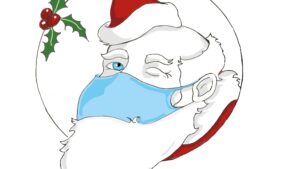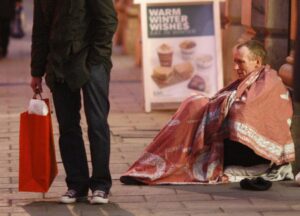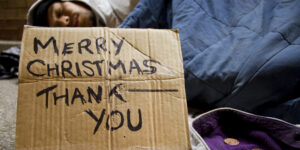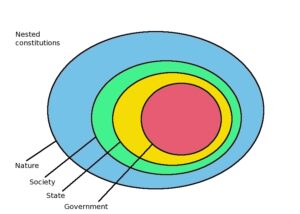Holigaze

This very unusual holiday season has unsettled many a traditional gathering and left a lot of us feeling adrift. One thing that hasn’t changed, though, are all the ornaments of our collective failure as a society, those people seemingly on every corner in town, holding cardboard signs, asking for help, looking with vacant eyes at all the prosperity passing them by.
Maybe the holidays sensitize us just a little, remind us to examine our inner-Scrooge and look more kindly on the less fortunate. Maybe we’re not as quick to avert our gaze and pass them by, forgetting them as soon as they’re out of sight. Maybe we give them a dollar or two, just to share the holiday spirit and ease our guilt.

When we walk down a city street, stepping over people sleeping on the sidewalks, ease around them where they huddle in doorways trying to get warm, or when we catch a glimpse of small fires burning in front of shacks and lean-tos clustered under bridges or in vacant lots on frigid winter nights, we can’t help but feel overwhelmed if we allow ourselves to feel anything at all.

Homelessness is a very visible problem, seeming perhaps too pervasive to be solved. It’s one that none of us likes to think about too much. And what we see is only the tip of a potential disaster, where many more people are on the margins of being homeless themselves.
Studies have shown that as many as 40% of Americans are one paycheck or one emergency away from homelessness here. And that was before the current pandemic shredded employment in many sectors of the economy.
So, what is there to do? We’ve talked about basic income. A way to get cash, reliable cash on a monthly basis, into the hands of people who desperately need it. We’ve shown some of the advantages to a free market economy that it would offer here.
What also is worth noting is the new thinking among economists about the effective use of public debt as a means of stimulating the economy and addressing critical needs here. How we choose to use those monies would be the question.
If banks can be deemed “too big to fail” and rescued from their credit derivatives meltdown with trillions of dollars, as they were in 2008, perhaps in 2021 we can reiterate the American social contract here and deem it too big to fail. There may be a greater purpose for our economy than making a very few very, very rich.

Perhaps the ghosts of Christmas will remind us to value American greatness by the way it treats the least of its citizens. Perhaps we finally can see the value of stabilizing and elevating their status in this land that has become so staggeringly prosperous for so very few.
We face serious challenges in the midst of a pandemic that emphasizes our many inequities as a society. The ranks of the unemployed, uninsured, impoverished, and homeless are growing daily here. We have choices to make about whether we will address those challenges or continue to turn a blind eye to the suffering of so many fellow Americans.
The new year is a symbol of renewal, rebirth, a fresh start. This would be an ideal time to rethink the way we as a society gauge success and how we allocate our resources to achieve it.
